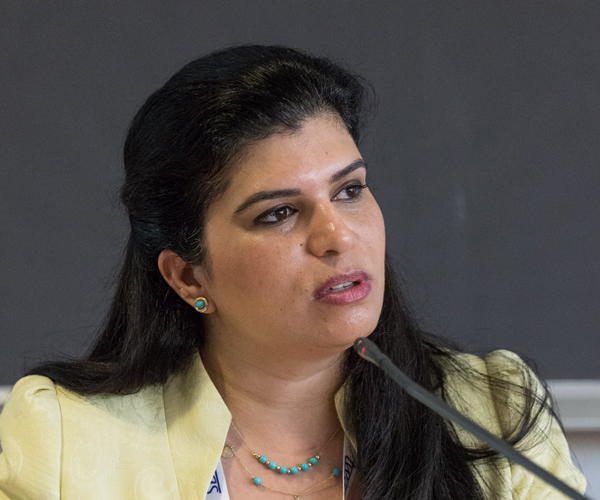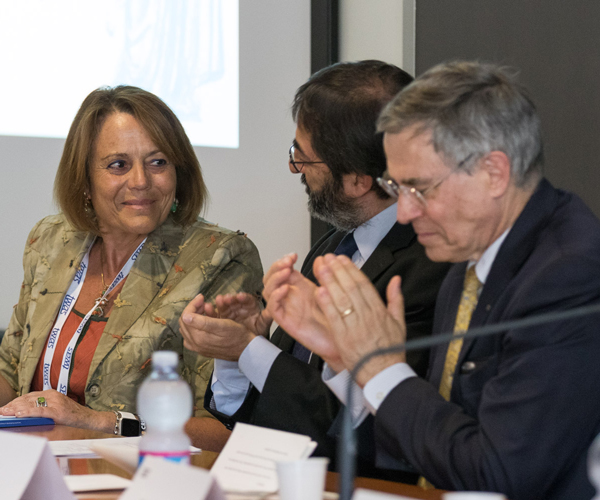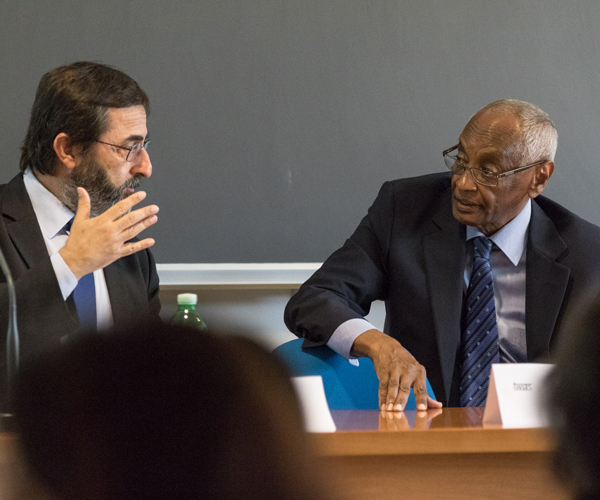 Nations can achieve progress and well being in many ways: one is through scientific collaboration and in the use of science for peace. And science diplomacy can help to create the environment for stronger, more determined scientific cooperation among nations at all levels.
Nations can achieve progress and well being in many ways: one is through scientific collaboration and in the use of science for peace. And science diplomacy can help to create the environment for stronger, more determined scientific cooperation among nations at all levels.
This was one of the core messages delivered at the opening ceremony of the summer course in science diplomacy, organized in Trieste, Italy, by the American Association for the Advancement of Science (AAAS) and TWAS. High-level science leaders from several nations offered a vision of science diplomacy as a valuable tool in helping nations to join in cooperative research and policy-development efforts that can drive economic growth and solve regional and global challenges.
Ultimately, they said, the practice of scientific cooperation can build stronger bonds between nations.
Scientists find it relatively easy to work and communicate across national boundaries, said Rush Holt, AAAS' chief executive officer and executive publisher of the journal Science. "Those are the same boundaries that politicians and diplomats deem impenetrable and insuperable. But international science cooperation can break down international barriers."
Holt, a former member of the United States Congress, was among the dignitaries who welcomed participants to the event. Princess Sumaya bint El Hassan, the president of the Royal Scientific Society of Jordan, and Vaughan Turekian, science adviser to U.S. Secretary of State John Kerry, gave opening speeches. Welcoming remarks also were offered by Mohamed Hassan, interim executive director of TWAS; Annapaola Porzio, prefetto of Trieste; Fernando Quevedo, director of the Abdus Salam International Centre for Theoretical Physics (ICTP); and Romain Murenzi, director of the Division of Science Policy and Capacity Building in UNESCO's Natural Sciences Sector. Minister plenipotentiary Fabrizio Nicoletti, head of the Bilateral and Multilateral Scientific and Technological Unit in the Italian Ministry of Foreign Affairs and International Cooperation (MAECI), was in the audience.
This year, the course was held from 11-15 July and included about 30 participants from 22 nations. Through presentations and exercises, they acquired ideas and tools to help them interact as advisers and qualified experts in their countries on science-related topics of international and local importance.
Science diplomacy is becoming increasingly well known and considered indispensable both in science and diplomacy, Hassan said in his remarks. And he added: "This is very encouraging as it is an essential tool to fuel international cooperation and meet the Sustainable Development Goals approved last year by the United Nations."
Hassan recalled how the science diplomacy training initiative was established through a 2011 agreement between AAAS and TWAS. Historically, he said, both organizations have been active in international science cooperation and science diplomacy. The term emerged in its contemporary form in 2008, when AAAS established its Centre for Science Diplomacy.
Trieste is the perfect venue to host a science diplomacy course, Hassan added. While the city isn't an international political or financial capital, ICTP/TWAS founder Abdus Salam saw it as an international science center and a hub for East-West and South-North cooperation. Today, Trieste hosts four international science centres and other scientific institutions focused on building bonds between scientists in the developed world and the developing world.
The lack of a unified scientific community in some parts of the world, including the Arab region, was a central topic in Princess Sumaya's speech.
The president of the Royal Scientific Society of Jordan, who also chairs the Board of Trustees of the Princess Sumaya University for Technology (PSUT), founded in 1991, mentioned the difficult situation that Jordan is facing, with growing challenges to security, environment and development. Throughout the region, all these fields would greatly benefit from a more robust and well-networked scientific community.
"Our nation and our region are in need of scientific input and engagement at all levels," she stressed. "But to build the necessary strengths, it's important to acknowledge critical weaknesses, such as poor funding and the inability of the Arab world to combine resources and ambition to work together with a common science agenda."
However, she also raised words of hope: "I firmly believe that we have moved through the worst of this era of civil dampening .... Within this framework, science diplomacy must provide opportunities for research and empowerment to our brightest scientists and engineers based on their professional merits."
The importance of working together to mobilize resources and activate partnerships among private investors, domestic agencies and international institutions was a lead theme in Turekian's welcome address.
As an example of resources mobilization, Turekian mentioned the Addis Ababa Action Agenda, adopted by international governments in July 2015.
The agenda includes three elements as part of a technology facilitation mechanism (TFM): an Interagency Technology Transfer Team to help mobilize both civil society and the scientific community; the creation of an online platform for quick dissemination of science, technology and information (STI); and a multi-stakeholder STI Forum, to engage governments and diplomats on STI for sustainable development.
"All of the challenges we face as a global community cannot be tackled by governments alone," Turekian maintained. "That's why we launched a new initiative called the Innovation Forum where we convene regular conversations between senior policymakers and global innovators, to inform foreign policy at the highest levels. In addition, we launched a network of science and technology advisers to foreign ministries," to provide the ministries with more access to adequate and timely advice.
Annapaola Porzio, prefetto of Trieste, commented on the difficult times the world is facing, where distances are shortened and there is rapid transmission of ideas and moving persons. "We are living in a particularly tough international contest," she observed "where science and science diplomacy can contribute to dismantling ideological and political myths."
As an example of international science collaborative effort, ICTP Director Fernando Quevedo, a theoretical particle physicist, mentioned the cooperative venture SESAME, the “third-generation” synchrotron light source under construction in Allan, Jordan. Quevedo noted ICTP's sustained commitment to developing high-level scientific programmes for developing countries. "Here at ICTP, with people from 80 countries all over the word, we are trying to create a culture of science in every country, important to the development of science diplomacy,” he said.
Romain Murenzi, who joined UNESCO after serving as TWAS executive director, praised the commitment that UNESCO has had in science for peace since its foundation, in 1945.
UNESCO, he said, is actively involved in activities that are, actually, science diplomacy. "About 60% of all activities are science diplomacy, and 44% of them have at least one component that refers to science diplomacy, science for diplomacy, or diplomacy for science." All these are key values in countries where a true collaborative spirit has not yet been developed.
Cristina Serra

